Definition and Use in Card Games
There has been a discussion of what is and what isn't card advantage in recent weeks after a spoiler of Dr. Strange from the defenders set was introduced.
The definition paraphrased from Wikipedia:
Card Advantage is a term often used in various strategic card games to indicate one player having "access" to more cards than another player.
The basic concept of card advantage is that one player has more cards in hand and/or in play than their opponent.
Card advantage is often also the result of making a play where your own cards are used to neutralize or eliminate a greater number of your opponent's cards.
Card Advantage is generally generated in four ways: Draw effects, Discard effects, Sweeper or Multiple Card Canceling Effects, and Combat. There are other ways of generating or losing card advantage but these are the main ones.
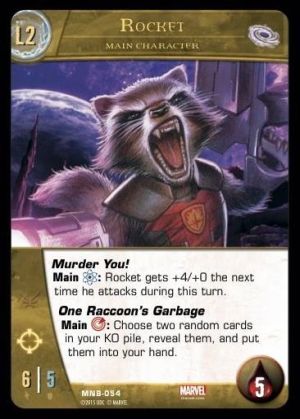
Card advantage is often stated in terms of X-for-Y, where X and Y are numbers; if X is bigger then it expresses card advantage, if Y is bigger it expresses card disadvantage; i.e. a 3-for-1 is a positive advantage, a 1-for-2 is not.(Rocket's second ability pictured above is an example of a 2-for-1)
Due to the ambiguous use of "access", there are arguments of what is and isn't card advantage and the different ways card advantage can exist. I believe the extended definition above with the clarification further in this article sheds a lot of light on the situation.
How it is applied to VS2PCG
In other games, card advantage can usually be seen easily but with card advantage built into cards in different ways in VS2PCG, it can be obfuscated at a glance. Here we will go over the different types of cards and how they can give you card advantage throughout the game. A lot of them are fuzzy and situational but I want to touch upon all of the ways at least briefly before diving into a recent heated discussion.
Characters in Combat
One of the ways listed above of gaining card advantage is Combat. There are multiple ways that characters can give card advantage in combat. Your character just being bigger and being able to stun or KO an opponents character and not be stunned or KO'd afterwards gains you card advantage and on a separate note board advantage, which will only briefly mentioned in this article as it probably merits an entire article itself.
How on earth is this card advantage? Well one of your cards is removing one of your opponent's cards and still sticking around so it is like removing an opponent's card for free. But you cannot count on this because it depends on so many factors that are out of your control. There are ways to change combat with regards to board state, formation, keywords, super powers, powering up, and Plot Twists, that you can't plainly say a character is or will be a clear cut source of card advantage. We will briefly touch base on all of these ways shortly.
Character Health
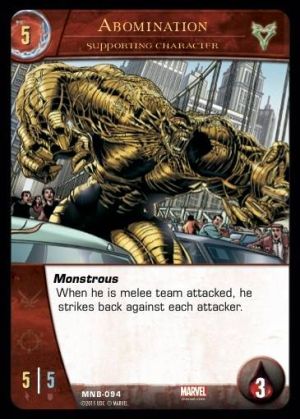
Health of a character can help gain card advantage as even if you and your opponents character both get stunned, but your character still remains on the table. In this example one of your cards can take a wound, yet possibly fully remove your opponent's card. This can be considered trading a partial card of yours for a possible full card of your opponents which is a form of card advantage. Again this is unpredictable due to several other factors including the relevance of your character at the time. Black Panther SC out against an Adam Warlock SC doesn't do much and probably will not be a source of card advantage in all honesty. Health is a tool of board advantage though it can be shut off at least temporarily with Magneto SC or taken advantage of with Thanos SC.
Character Keywords
Keywords are also very situational to when they would give advantage. Flying can help you attack a back row character that your opponent is trying to protect, but only in certain circumstances and only if your opponent does not have a character with flying or grab in the front row that you can not get around.
With ferocious you can strike first and stun your opponent before it can strike back, though they can have ferocious as well or just too large of a defense to stun in the first place.
How about ranged? The opponent's character doesn't even get to strike back!... if the character can be ranged attacked or doesn't have ranged itself only. I could continue and list off every keyword and find a situation where it doesn't work.
Genius is an interesting keyword that is often brought into card advantage discussions. It literally draws you a card if it can stay unstunned throughout a turn. Characters with genius are usually targeted as quickly as possible and are often called "lightning rods" as they attract attention. If you can protect a character with genius then more power to you. Even if they survive a turn they are a cantrip at that point.
Schemer is a keyword, shown as an example on Loki SC, which will provide immediate card advantage if you can play a plot twist the turn he comes into play, though if is a big word there. This one is often overlooked as Loki SC isn't played very often. The fact that he isn't played often is a testament to the fact that there are so many more things in this game than card advantage that matters which is a great thing.
There are many other keywords but the truth here is also the fact is how you play the card and based on the current board situation.
Plot Twists and Powering Up
Plot Twists and Powering up are usually used to get or maintain board advantage, or to prevent or cause a wound. Used in combination with specific characters, in specific scenarios, they can be a source of card advantage but they are typically 1-for-1 trades to gain board advantage. Defensive plot twists are more potent than offensive plot twists as Find Cover gives +0/+3 and Super Senses gives +0/+5 where as Open Fire gives +2/+0 and Earth's Mightiest Heroes gives +2/+2. So multiple pumps or plot twists are required to overcome a single defensive plot twist most of the time and can in situations give card advantage. Even the Odds is such a great card in an aggressive deck, in addition to being a great card in a control deck, as it can remove counters and pumps as well as revert some of the played plot twists such as Find Cover and Super Senses. I won't go over every plot twist and how it could lead to card advantage, but I'm sure you can figure out many other situations where you can trade one plot twist for multiple other cards.
Locations & Super Powers
Here is where recent heated discussions have focused. It is no surprise that due to the ambiguity of what people consider card advantage due to "access", that there would be polarizing opinions of what card advantage means. Locations in this game activate super powers which are usually pretty amazing and are generally about as powerful or often cases more powerful than a card would be.
At the beginning of the article I displayed a picture of Rocket Main Character Level 2 as it is easy to see Card Advantage built in as paying a  to gain two random cards out of your KO pile. This one is pretty easy to see a 2-for-1 as you get two cards for one card. We will move on and not spend too much time on Rocket, only that he is worth mentioning but I plan to have a separate article for him eventually. We must move on to the meat and potatoes of the article.(which we will boil, mash, and stick in a stew)
to gain two random cards out of your KO pile. This one is pretty easy to see a 2-for-1 as you get two cards for one card. We will move on and not spend too much time on Rocket, only that he is worth mentioning but I plan to have a separate article for him eventually. We must move on to the meat and potatoes of the article.(which we will boil, mash, and stick in a stew)
Here we present the culprit of the start of these heated debates:
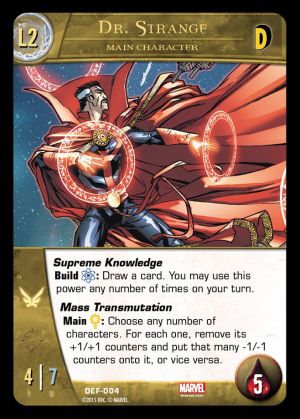
The topic of debate at the moment is whether or not his ability is card advantage or not. Is it cycling? Is it card advantage? Is it worth playing? I can answer the first two of these questions but not the latter. The latter depends on metagame choices and how well he does in play.
Well what is this cycling word you speak of mean?
Cycling in Magic: The Gathering is a keyword ability that allows a player to pay a cost that includes discarding the card. When the activated ability resolves, that player draws a card.
What the heck does that mean?
For those not savvy to Magic: The Gathering, you pay a cost, discard a card, sometimes get an extra effect, then draw a new card. It has been used in other
board and card games as a generic term to pitch or get rid of a card to draw a new one. With Doctor Strange, if you use the ability from your hand,
you are discarding a location that produces  to pay for the cost and drawing a card which essentially is cycling at it's core. There is no extra effect if
you are using Mandarin SC or if you have already leveled up to Dr. Strange MC level 2 to gain this or a similar effect, but if you have Dr. Strange MC level 1 out,
he will also get a level up counter which is pretty important. It is a general consensus that cycling is not card advantage because you are trading 1-for-1. It is
basically like it was never there and you just paid the cost with the same card, though that isn't entirely accurate as KO piles can matter and future cards could
interact with them specifically.
to pay for the cost and drawing a card which essentially is cycling at it's core. There is no extra effect if
you are using Mandarin SC or if you have already leveled up to Dr. Strange MC level 2 to gain this or a similar effect, but if you have Dr. Strange MC level 1 out,
he will also get a level up counter which is pretty important. It is a general consensus that cycling is not card advantage because you are trading 1-for-1. It is
basically like it was never there and you just paid the cost with the same card, though that isn't entirely accurate as KO piles can matter and future cards could
interact with them specifically.
With 4 Laboratory in your deck, it is almost as if you had a 56 card deck instead if you only plan to use the Laboratories to cycle and not to activate other characters super powers. If you never intend to use the defenders location on any other other super powers other than this one, which probably will not be the case, it would be almost similar to having a 52 card deck. With a smaller effective deck size, you will have a better statistical chance to draw relevant cards in your deck. Playing with this way actually "thins" your deck out which is a good thing though probably will not be optimal.
Problem Solved, Dr. Strange is just cycling then and we can put the argument to rest... Well not exactly.
Playing a Location as a Resource
Players have pointed out the merit that if you play the laboratory as your resource for turn, mathematically you end up with an extra card from the ability, in contrast, to playing a face down card as a resource and then using a laboratory from your hand to cycle.
Well why wouldn't you just save them and play them as resources as cycling just seems bad? Does this still thin your deck? Everything is so confusing can you please help me understand?
You can only play one resource a turn a you will probably want to level up Dr. Strange MC level 1 quicker than that. In addition to that, you could have other locations in your hand that you might want to play to not get hit by Ronan's discard or a slew of other reasons. This does still thin your deck this way if you were wondering but there is a kicker here that most people don't quite get.
I'll go over an example in a vacuum so that it might be easier to understand:
Dr. Strange MC laying a location vs Dr. Strange MC Cycling a location vs Winter Soldier MC Faceoff!
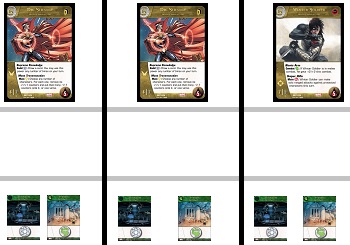
Let's say with these characters, you both are playing at the same time just for this example to show the parodies of locations and what is deemed as card advantage vs what is not.
All have their MC out and several other characters but only one two cards in hand to put everything equal, let's say the same two cards in fact. A Laboratory and a Fortress.
Step 1:
Let's all have them play a location. The first Dr. Strange is going to play the laboratory, the second Dr. Strange is going to play a Fortress, and Winter Soldier is going to play a Fortress. Everything is equal with one location out and one card in hand.(Image Below)
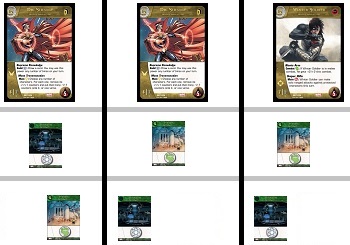
Step 2:
We are going to have the First Dr. Strange player use his super power to draw a card during his main phase by flipping over his laboratory on the field. The second Dr. Strange player will cycle the laboratory in hand for a random card. The Winter Soldier player will remain as is for now.(Image Below)
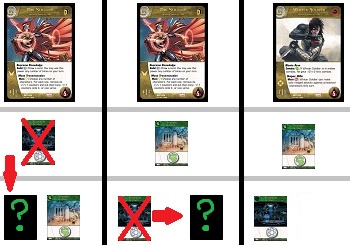
Step 3:
Right now we are going to look at the state of the board but not change anything. It clearly shows that the first Dr. Strange has the advantage card wise due to more cards in hand. But is it really the case? We will figure that out in the next step.(Image Below)
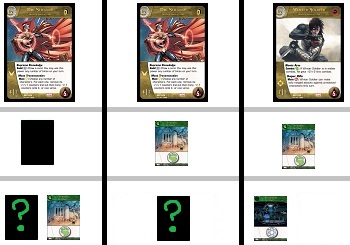
Step 4:
Looking at the second Dr. Strange and Winter Soldier players board states, you may notice that those players have the potential unused location which could be used by another character or be used to activate Winter Soldier's super power in his case. His ability is in essence Earth's Mightiest Heroes is it not? I think that ability is worth a full card given the circumstances. Let's say all three players activate a super power from another character and they don't wait until the next turn to lay another resource because it needs to be used now.(Image Below)
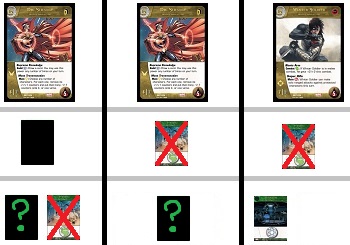
Step 5:
As we see in the next image, the end board state they all have essentially the same thing out card advantage wise. Both Dr. Strange characters are one card deeper into their deck which is what I explained earlier with cycling but this is an example of it.(Image Below)
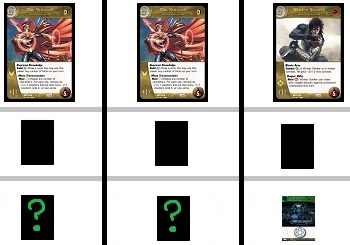
All 3 situations leave the players with one card in hand. Winter Soldiers card in hand is a laboratory while the other two have a random card. That random card is cycling.
Cycling is advantageous as both Dr strange players are one card further into their deck, increasing the odds of drawing a powerful card, though it is random and perhaps the laboratory is all the winter soldier player needed.
What can we take away from all of this?
The source of Card Advantage here is the fact that you played a location as a resource instead of laying a card face down as a resource, which is in itself card advantage because in addition to laying a resource, activating a super power is usually around the equivalent of playing a card, sometimes better than a card and sometimes worse depending on the situation.
It is advantageous to lay a location over a face down card always as you get a full or partial card or card like effect out of it but there are situations where you might not want to lay the location. I can prove it in a longer article about a couple of situations, but this should tease suffice for now.
About the Author
PauperTim is this websites owner and has always been into games of all sorts. He is a founder of the Pauper format for Magic: The Gathering. You can find him on facebook, twitter or OCTGN as PauperTim or as TheOrangeMitten on Magic Online.